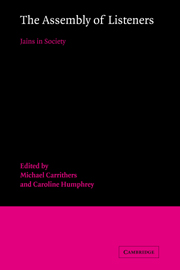Book contents
- Frontmatter
- Contents
- List of illustrations
- List of contributors
- Acknowledgements
- Map: South Asia
- Introduction
- 1 Jains as a community: a position paper
- 1 JAIN IDEALS AND JAIN IDENTITY
- 2 LOCAL JAIN COMMUNITIES
- 3 JAINS IN THE INDIAN WORLD
- 10 Jains in the Indian world
- 11 The Digambara Jain warrior
- 12 Is there a popular Jainism?
- 13 Fairs and miracles: at the boundaries of the Jain community in Rajasthan
- 4 NEW JAIN INSTITUTIONS IN INDIA AND BEYOND
- Conclusion
- Glossary and pronunciation
- Select bibliography
- Index
10 - Jains in the Indian world
Published online by Cambridge University Press: 07 October 2011
- Frontmatter
- Contents
- List of illustrations
- List of contributors
- Acknowledgements
- Map: South Asia
- Introduction
- 1 Jains as a community: a position paper
- 1 JAIN IDEALS AND JAIN IDENTITY
- 2 LOCAL JAIN COMMUNITIES
- 3 JAINS IN THE INDIAN WORLD
- 10 Jains in the Indian world
- 11 The Digambara Jain warrior
- 12 Is there a popular Jainism?
- 13 Fairs and miracles: at the boundaries of the Jain community in Rajasthan
- 4 NEW JAIN INSTITUTIONS IN INDIA AND BEYOND
- Conclusion
- Glossary and pronunciation
- Select bibliography
- Index
Summary
Jains have always lived as a minority – at best, a plurality – in a rich and astoundingly varied cultural milieu in India. These three chapters concern the Jains' profound engagement with that wider world, the ways in which they have continued to mark themselves off, and the accommodations they have made.
In his chapter the Indologist Padmanabh Jaini asks whether there is a ‘popular Jainism’? The sense of this question derives from a comparison with Theravada Buddhism, which in Jaini's view had gone very far towards incorporating relatively unreflective but fundamental and widespread practices and attitudes from the Indie world. Jaini shows that Jain writers in the medieval period vigorously opposed such common practices as offerings to the dead, worship of trees and mounds of earth, ritual bathing, observances connected with celestial events and the worship of deities. Jains did incorporate Indie deities into their temples, but gave them a subsidiary place, whereas Buddhists in Sri Lanka elevated similar deities to substantial positions in official Buddhist doctrine and practice.
The strong terms in which Jain writers opposed such practices gives the term ‘popular’ a clear meaning: those beliefs and practices which did not accord with the learned Jain interpretation of what belonged to Jainism (jainadharma) itself. Sri Lankan Buddhists did, on this showing, seem considerably less concerned to police their boundaries.
- Type
- Chapter
- Information
- The Assembly of ListenersJains in Society, pp. 165 - 168Publisher: Cambridge University PressPrint publication year: 1991



